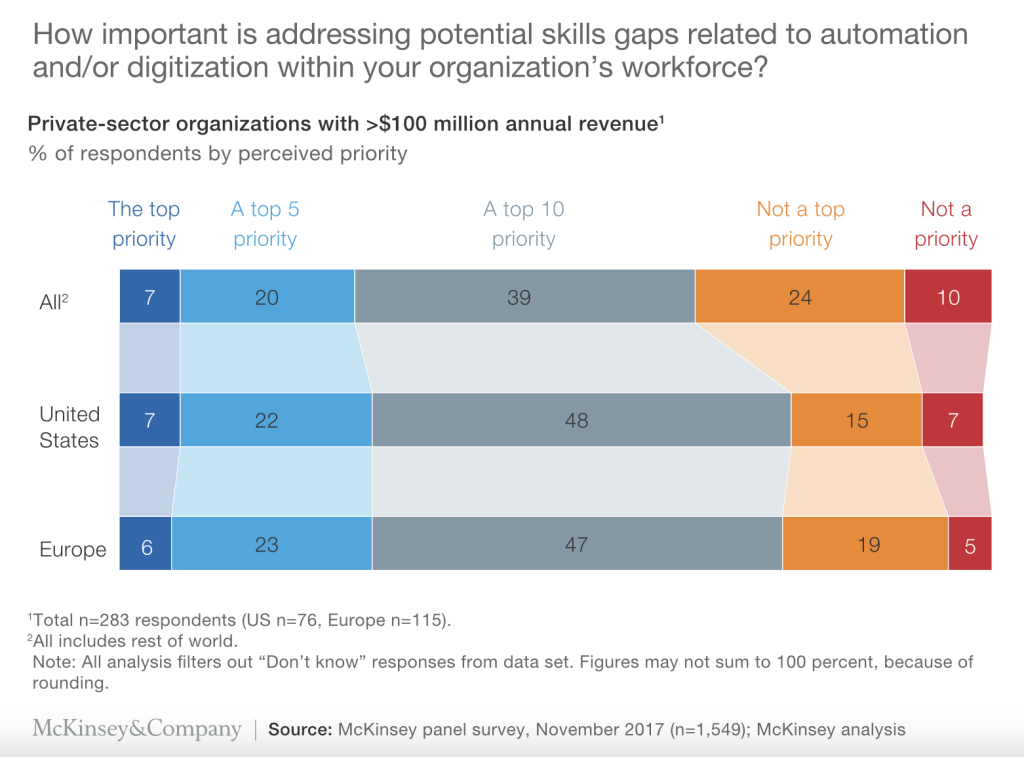Artificial intelligence is not just a fleeting trend, it’s fundamentally redefining the workplace. This evolution prompts a significant question: what lies ahead for employees as AI reshapes their roles? The responsibility of preparing employees for this change does not fall solely on the individual. It also presents an opportunity for companies pioneering in artificial intelligence to lead initiatives in talent development and reskilling. This investment in the future is critical for creating synergy with artificial intelligence, ensuring sustainable growth, and facilitating collaboration between people and advanced systems.

Reskilling for AI: A Corporate Responsibility
The people analytics firm Visier revealed in a survey with over 3,000 individuals from the USA, UK, Canada, and Germany that 86% of employees believe their companies must play a role in reskilling to avoid being easily replaced due to artificial intelligence, and more than half of these employees state that fulfilling this is the employer’s responsibility.
McKinsey insights indicate a turning point for the workforce, showing that significant changes are needed by 2030 due to artificial intelligence and automation. Reskilling and retraining are becoming crucial, managers are playing vital roles in initiating this transformation. They must make quick and accurate decisions to enhance productivity and secure a competitive advantage in the rapidly changing digital landscape in their corporate decisions. Consequently, companies are working on innovative partnerships and new learning models concerning future expectations.

The McKinsey survey quantitatively addresses this change: a vast majority of managers see upskilling their employees as a top priority. As companies operate in the age of artificial intelligence, the real challenge lies not only in achieving corporate success but also in implementing innovations that can position the workforce to take responsibility in the face of the industry’s changing needs.
Given the pace of change, leaders are seeing a significant transformation coming with artificial intelligence. A Gallup survey shows that only a few leaders think artificial intelligence will change jobs in the coming year. However, looking three years ahead, a much larger number of managers, about two-thirds, believe that artificial intelligence will greatly change jobs.

This means businesses need to start training their employees now for the new types of jobs that will emerge with artificial intelligence.
Workforce Calls for Employer-Provided AI Training
At the start of 2024, GetApp surveyed over 1,000 employees in the United Kingdom about how artificial intelligence will affect their working lives. A 79% majority concluded that they need to improve their skills, especially in analytics and programming, to not fall behind AI developments. In an environment reported to have a ”talent war” for gathering a digitally skilled workforce, this situation makes offering courses related to artificial intelligence a very crucial element of retention strategies.

Emerging Job Opportunities with Artificial Intelligence
The replacement of automation with a human job can be considered only a short-term gain in this era of artificial intelligence development, the long-term gain would be humans working alongside artificial intelligence by training, explaining, and sustaining (employees who continually work to ensure that AI systems are functioning properly, safely, and responsibly).
Companies can strategize by replacing roles at risk of unemployment due to AI with new roles that will accompany AI. According to the survey conducted by the World Economic Forum, around (49%) of companies are planning to adopt artificial intelligence which will lead to creating a vast number of AI-related positions such as business intelligence analyst, data scientist, and data engineer. As per the survey, 65% of companies are planning to reinvest in their workforce by upskilling their current employees to meet the demands of the evolving industry.
The CEPR survey results predict that artificial intelligence could increase global economic growth by 4-6% annually over the next decade. This growth is tied to artificial intelligence’s ability to improve productivity positively through data analysis and automation. However, there is still a lot of uncertainty, as there are ongoing new developments in artificial intelligence, and it is challenging to predict exactly what changes these developments will bring.
Dual Impact of AI and Automation
Routine and repetitive jobs can lead to displacement by automation and artificial intelligence, on the other hand, artificial intelligence can create new demand for skills and industries, with the adaptation of artificial intelligence creating new highly skilled AI-expertise jobs, leading to development and innovation in this field and in the result contributing to the economic growth and opportunities. However, the priority is to invest in policies that support innovation, skill development, and education. Artificial intelligence will boost economic growth, education, and innovation in new technologies by replacing roles available for automation with more skilled roles with the correct policies and upskilling education. The strategy and policy that will be followed during shifts have a crucial role in the coming years. Artificial Intelligence and automation will drive economic growth, which will also lead to the growth of companies. In this position, companies have a role in contributing to and benefiting from this shifting era by providing educational policies for the new roles that will accompany this growth. According to Business Insider, there will be a messy transition and the shift will be so massive that some of the jobs will disappear If one-quarter of the jobs get automated, it will create one-quarter of unemployment.
Conclusion
In the era of shifting to automation and artificial intelligence, big companies have a significant role in investing in their employees for the benefit of both the company and the employee. With the new era, companies will begin searching for company-specific AI expertise, which will be hard to obtain and find. Thus, reskilling and upskilling employees for these positions will create a significant advantage against their competitors, and in the end, both the employee and the company will profit from the education policy. Additionally, it will create a reputable image for the company by supporting the industry and its employees.


